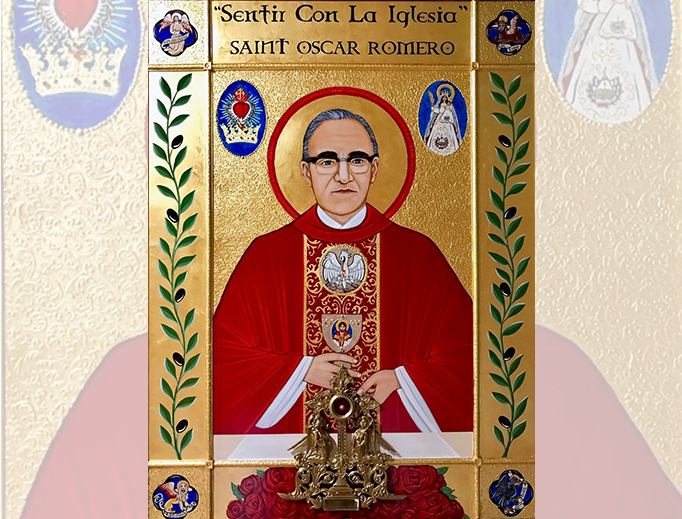Saint Oscar Romero

I was a Jesuit Novice when Archbishop Oscar Romero was assassinated on March 24, 1980. I was “on experiment” at a retreat house near Cincinnati. I was working with a fellow novice, an American who had spent time in El Salvador before entering the Novitiate.
Because of Joe’s background, I heard plenty about Romero in those days immediately after his brutal death as he celebrated the Eucharist.
Now, almost forty years later, Oscar Romero has been canonized. I know that there are people who are not in favour of the declaration of sainthood. There have been constant obstacles and delays, starting with the powerful in El Salvador and including many who had concerns that he seemed too tied up with Liberation Theology.
The complaint was that he had not died for the faith, but because he had interfered in politics. Yet, there are also many people – especially the poor – who recognized Romero as a saint long before Rome got around to it. The poor and powerless have a new saint to appeal to.
Who is Archbishop Oscar Romero? When the Archdiocese of San Salvador needed a new archbishop in 1977, there was satisfaction in government circles that the Vatican’s choice fell on the relatively little-known Oscar Arnulfo Romero.
He was bishop of a small rural diocese in the east of El Salvador. The general expectation was that he would have little to say about the injustice and violence rampant in the country. The powerful assumed that he wouldn’t disturb the church’s cosy relationship with the military and ruling elite.
His tenure of office in San Salvador was very short – only three years, but what a heroic and inspirational leader he turned out to be. He gradually came to see that he could not ignore the prevalent and intolerable situation. God gave him the wisdom and the courage that he needed and he did not fail in his duty.
The new archbishop did not have long to wait before having the opportunity to declare where he stood. The Jesuits had been particularly courageous and outspoken on behalf of the victims of the oppression and in their criticism of injustice.
Soon after Romero became archbishop, Father Rutilio Grande, a Jesuit and the parish priest of a village in the archdiocese, was assassinated by a death squad. The archbishop was swift, unequivocal and public in his condemnation of the crime.
Romero was transformed by the reality of the suffering in El Salvador. His eyes were opened to the grim reality of that country and he started to speak up increasingly, to challenge the status quo.
Mary Jo Leddy is one of the founders of Toronto’s Romero House, a house for welcoming refugees. She sums up Romero: “A shy and quiet man, bookish and careful, he became the voice of the voiceless.”
His transformation and conversion came about in a gradual way as he encountered more and more of the poor, witnessing the poverty and oppression of rural farmworkers.
Archbishop Romero spent Monday 24 March 1980 with a group of his priests, relaxing at the beach, an hour’s drive south of San Salvador. In the afternoon he returned to the city and to his own house, a little cottage in the grounds of a hospital. He then walked the short distance from his cottage to the hospital chapel.
He had arranged to celebrate an evening Mass there. Having completed the Liturgy of the Word, he had just taken the bread in his hands to commence the Liturgy of the Eucharist when a shot was fired and he fell to the floor behind the altar, dying or already dead.
A hired marksman had been driven into the hospital grounds and, from the vehicle and through the open door of the church, had fired the fatal shot.
Oscar Romero’s death shocked millions of people throughout the world.
Pope Francis has made the canonization of Oscar Romero a personal priority. Before that, in 2008, Pope Benedict XVI praised Archbishop Romero as a “pastor filled with love of God”, committed to the preaching of the Word of God. For the present pope, Romero is a martyr and a bishop who exemplifies what it is to be a poor Church for the poor.
Francis has described Romero as a martyr for the love of neighbour, who had died for justice. Oscar Romero is a model for imitation. In the witness of his life, we can see what Francis means by his vision of a poor Church for the poor. Romero is an example of a bishop who has ‘the smell of the sheep’ and who walks alongside his flock.
On 30 October 2015, the pope said that the martyrdom of Romero had continued even after his death:
“Archbishop Romero’s martyrdom did not occur precisely at the moment of his death; it was a martyrdom of witness, of previous suffering, of previous persecution, until his death. But also afterwards because, after he died — I was a young priest and I witnessed this — he was defamed, slandered, soiled — that is, his martyrdom continued.”
Saint Oscar Romero, Voice of the Voiceless. Pray for us!




Catherine von Zuben
Posted at 09:07h, 15 OctoberThank you Philip for this beautiful commentary on the life and death of St. Oscar Romero. How blessed we are to have a Pope who also, ‘has the smell of the sheep as he walks alongside his flock”
Peter Bisson, SJ
Posted at 09:56h, 15 OctoberThank you Philip!
Grace Colella
Posted at 12:15h, 15 OctoberThank you for this informative and reflective post.
Esther Buckley .
Posted at 15:09h, 16 OctoberThank you Father Shano for your beautiful tribute to Saint Oscar Romero. I believe he was a saint when he lived on this earth.
Bernard Carroll, SJ
Posted at 21:38h, 16 OctoberThank you Philip for this and all your very inspiring and thought provoking reflections.